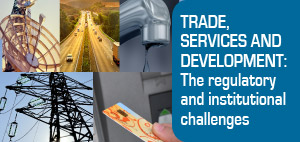Transport, telecommunications, and energy are among “infrastructure services” that play a vital role in economic growth. From 25 to 26 February, experts will discuss how developing countries can set up rules and institutions that help ensure such services.
 The two-day session is called “The Multi-Year Expert Meeting on Trade, Services, and Development: the Regulatory and Institutional Challenges”.
The two-day session is called “The Multi-Year Expert Meeting on Trade, Services, and Development: the Regulatory and Institutional Challenges”.
Practitioners and academics from developed and developing countries will seek to identify “best-fit practices” at the levels of policymaking, regulations, institutions, and trade negotiations that link services, trade, and development in a balanced manner.
Encompassing transport, telecommunications, energy, water, and financial services, infrastructure services sectors (ISS) are closely associated with economic competitiveness and income levels.
That is because ISS fosters productivity growth in economic activities that use infrastructure-related services as inputs. These activities contribute directly and indirectly to growth, income generation, and higher living standards.
Weak ISS, on the other hand, often hampers the development of other economic sectors, including services sectors, particularly in least developed countries and small and vulnerable economies.
ISS also assumes an important social function, as it ensures access to basic services (including electricity and safe drinking water), enhances financial inclusion, and helps bridge the “digital divide.” It is thus considered important for the achievement of the Millennium Development Goals.
For infrastructure services to contribute successfully to the economic and social development of a country, the regulatory environment must be supportive. The challenge is to design appropriate regulations. Recurrent failed attempts to do so indicate the inherent difficulty of the undertaking.
Experience has revealed that no “one-size-fits-all” model exists for addressing such regulatory and institutional challenges. Moreover, regulatory reform often is an incremental process. The review of best practices for building proper regulatory and institutional frameworks catering to the specific needs of individual countries is considered a helpful way to proceed.
The expert meeting will examine experiences in four key areas:
- Attracting and sustaining investment (including cross-border investment) through enabling regulations and institutions;
- Benchmarking performance in ISS (including how to set functional variables to benchmark the performance of providers and how to overcome data constraints);
- Stimulating innovation and adapting regulation to changing markets (for example, regulation as stimulus and dispenser of innovation); and
- Ensuring universal access in different ISS (including fair access to financial services) ?


